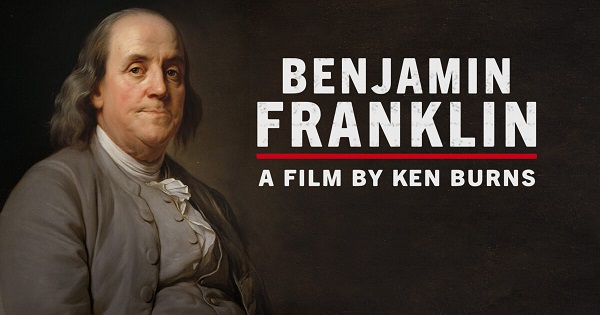First airing on PBS (Public Broadcasting Service) on April 4th and 5th, Benjamin Franklin (2022) is a documentary directed and produced by Ken Burns. Writing credit for the two-episode documentary rests with Dayton Duncan of polymath and Founding Father of the United States, Benjamin Franklin.

There is much remarkable about the man who, but for the prominent general and first president of the United States, George Washington, might be remembered today as the first among “the most prominent statesmen of America’s Revolutionary generation,” which is a definition for Founding Father offered by the Encyclopædia Britannica. The two-episode documentary series offers much in terms of placing Franklin in context regarding who he was, how he went about making his mark in the world, and some contextual thinking around what Franklin can mean to American culture in today’s world.

Franklin was the youngest of Josiah Franklin and Abiah Folger Franklin. Josiah Franklin had seven children with his first wife and ten with Benjamin‘s mother, making for an upbringing that lacked a significant quantity of formal education. Raised Presbyterian with his father a soap and candle maker, we learned in Join or Die (1706-1774) that Benjamin was eventually apprenticed to his brother James Franklin, who had returned from a trip to England at age 24 with a printing press. That Josiah mediated the relationship between James and Benjamin, often to the just advantage of the talented and younger Benjamin.

The New-England Courant newspaper was founded in 1721 by James Franklin. Benjamin Franklin would learn the newspaper trade from this independent newspaper, inventing Silence Dogood as “a fictitious character, the widow of a country minister, “an Enemy to Vice, and a Friend to Virtue”. She abhorred arbitrary government and unlimited power,” as noted here as well as in the documentary. The newspaper eventually gave way in part owing to the religious sensibilities of Boston at the time, in addition to the liberal viewpoint of the newspaper. The lessons taken from the larger experience would serve the younger Franklin in a lifetime of business and political leadership that would follow. From the human perspective, that Benjamin would own slaves, trade in slavery using the newspaper as a vehicle, and benefitted from a lack societal integration in race while financially gaining from slavery were raised; slavery in the United States was not a strictly southern agricultural notion.

The documentary recounted the end of the apprenticeship between James and Benjamin, with adventures specifically in Philadelphia with the meeting of his future wife, Deborah Read Franklin. The first meeting of Deborah and then seventeen-year-old Benjamin was recounted to comedic effect in Benjamin Franklin‘s Autobiography of Benjamin Franklin. Read Franklin “watched the tall, husky youth pass her father’s shop on Philadelphia’s Market Street, chomping on a roll of bread. His pockets bulged with extra pairs of socks, and he carried two more rolls, one under each arm. As she watched, Deborah giggled out loud.” That Read Franklin ran the family businesses freed her husband to pursue local and national politics for decades before and after the American Revolution.

The relationship between American revolutionary Benjamin Franklin and his illegitimate son William Franklin, was complicated. William would become a Royal Governor of New Jersey, actively working to circumvent diplomatic efforts of his father in favor of colonial independence. The circumstances of the coldness and break between father and son were largely shared during the An American (1775-1790) documentary episode. William‘s imprisonment in Connecticut came during the revolutionary war, with the wife of Benjamin‘s son, William, dying while William was in prison. “William Franklin and Benjamin Franklin never reconciled their differences,” as noted here as well as in the documentary. How future president John Adams and Benjamin Franklin were in conflict regarding ambassadorial approaches to France during the revolutionary period of American history was addressed interestingly in the Burns documentary.

I have been particularly interested in Benjamin Franklin as a subject of study for at least a couple of decades. I found that the documentary offers insights into the man and his role in the formation of what is the United States. That information I had encountered previously was revisited in this documentary did not feel distracting. Many subjects and themes within this film were not specifically mentioned within this review. I grant the documentary Benjamin Franklin as directed by Ken Burns 4-stars on a scale of 1-to-5.
Matt – Wednesday, May 11, 2022
